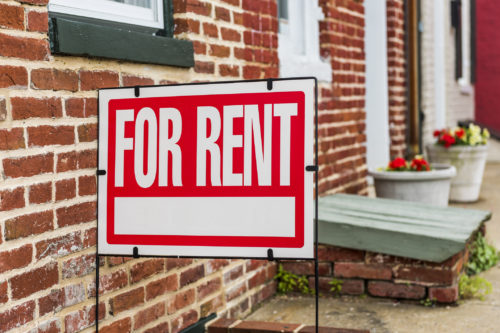
How Cities Can Ensure Better Rentals for Everyone
Today, Rocky Mountain Institute (RMI) released a new report, Better Rentals, Better City: Smart Policies to Improve Your City’s Rental Housing Energy Performance, which aims to inform city leaders on mechanisms that can boost energy performance improvements in rental housing that benefit tenants, landlords, community leaders, and the environment.
While much of RMI’s research and analysis on home energy performance has focused on real estate transactions to stimulate the market for home energy upgrades, existing rental housing upgrades remain a critical yet unaddressed issue in reducing the overall footprint of the residential sector in a particular city and nationally—given that 37 percent of the US housing stock is rented.
Plus, for many of us, poorly performing rentals are all too familiar.
When I was in college, I thought I hit the jackpot when I convinced my roommates to give me the biggest room with large bay windows in the house we were renting for the year. I quickly realized my mistake when the Wisconsin winter came and my big, single-paned windows kept my room at a brisk 55 degrees. Looking back, I can laugh remembering my roommate asking me to close my bedroom door because she was getting cold from the draft. Needless to say, I spent most of my time in bed, wrapped in blankets, wearing my warmest slippers, waiting for winter to pass. Despite the cold temperatures in my room, our energy bills were still hundreds of dollars a month—less than ideal for a bunch of broke college students. Stories like this are all too common with rental properties. Because the landlord doesn’t live in the home and doesn’t pay the energy bills, he or she has no motivation to upgrade the efficiency of the rental property. This split incentive leads to energy insecurity, thermal comfort issues, and energy-intensive rentals.
An Innovative Model for Better Rental Properties
Luckily, the city of Boulder, Colorado, has a solution to this problem. Boulder’s SmartRegs program is one of the first of its kind to require minimum efficiency standards for residential rental properties. By the end of 2018, all rental properties in Boulder are required to meet minimum efficiency standards or they will not receive their rental license. This policy will go a long way toward improving tenants’ thermal comfort and lowering their energy bills. This policy also benefits Boulder, since it will help the city get closer to meeting its ambitious climate goal of 80 percent carbon reduction by 2050. Residential housing stock makes up 20 percent of Boulder’s carbon emissions, and rentals comprise more than half of the residential housing stock. This policy is powerful because it addresses efficiency in existing living units, which is important considering that more than 70 percent of living units were built before an energy code was even in place, and therefore are extremely inefficient. As of March 2018, Boulder’s policy for minimum efficiency standards for rentals resulted in efficiency upgrades in 15 percent of the city’s total housing stock.
This policy was a success for Boulder and could be a powerful tool for other cities as well. In the Better Rentals, Better City report, we looked at the impact of a similar policy for five other US cities with large rental markets and rental licensing programs already in place— Boston; Minneapolis; Oakland, California; Philadelphia; and Washington, D.C.—and found that, on average, at a cost of about $13 per rental, energy bills could be reduced by $390 per rental per year. Further, programs in these five cities combined would reduce carbon emissions by 1.2 million tons, an equivalent impact to building all new residential properties in these cities to a net-zero energy standard for the next eight years.
To scale this policy to other cities, RMI developed a framework shared in our new guide that takes successes and lessons learned from Boulder’s policy. The framework walks city policymakers through the following steps in developing effective minimum efficiency standards for rentals policy:
- Fit: Determine the effectiveness of the policy with respect to the city’s existing housing stock, including the number of rentals and whether a rental licensing program is already in place.
- Impact: Perform an analysis to determine the impact of minimum efficiency standards for rentals, including the cost to the city, energy savings, and carbon emissions avoided.
- Consult: Work with local property managers and owners to understand and address concerns as well as to develop a cost-recovery strategy to ensure affordability.
- Finance: Codevelop financing options with utilities and lenders that can spread the up-front cost of these investments over the lifetime of the equipment.
- Implement: Develop an implementation framework that includes selection of the implementation tool (home energy score, home energy rating system, or city-created checklist), cost analysis to determine the city’s efficiency target, workforce required, and energy collection and reporting requirements.
- Compliance: Create a compliance framework that includes a compliance timeline, an alternative compliance path, cost caps, exemptions, verification, and noncompliance penalties.
- Disclose: Develop a disclosure framework that makes rental energy data transparent to tenants.
Minimum efficiency standards for rentals will raise the floor of the residential housing stock, and in doing so get us closer to our carbon goals, reduce energy insecurity, and create local jobs—not to mention keeping renters’ energy bills lower and fewer of us wrapped in blankets all winter!
What’s Next?
Rocky Mountain Institute will work with a cohort of select cities to create working groups and provide technical support around implementing minimum efficiency standards for rentals. Cities are leading in the US fight against climate change and RMI will help first movers achieve their goals with free technical assistance. Please contact us if you wish to be involved or learn more.
